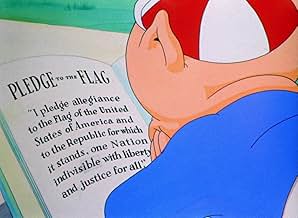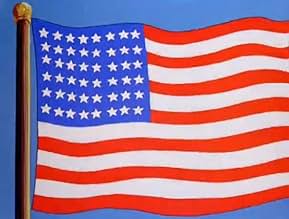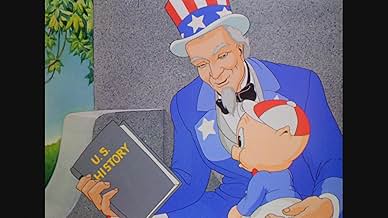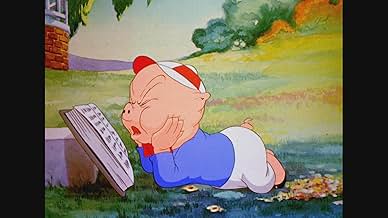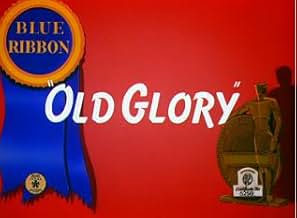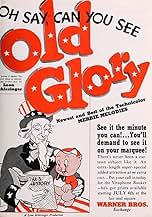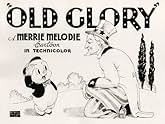Porky suddenly refuses at learning the Pledge of Allegiance until Uncle Sam appears to him in his dreams and gives him a lesson in American history.Porky suddenly refuses at learning the Pledge of Allegiance until Uncle Sam appears to him in his dreams and gives him a lesson in American history.Porky suddenly refuses at learning the Pledge of Allegiance until Uncle Sam appears to him in his dreams and gives him a lesson in American history.
John Deering
- Uncle Sam
- (voice)
- (uncredited)
John Litel
- Patrick Henry
- (archive sound)
- (uncredited)
Shepperd Strudwick
- Paul Revere
- (voice)
- (uncredited)
- Director
- Writers
- All cast & crew
- Production, box office & more at IMDbPro
5.2823
1
2
3
4
5
6
7
8
9
10
Featured reviews
Old Glory? Yes. Fun? No way.
This is one of those Looney Tunes cartoons used by Warner Brothers not mainly to entertain kids, but to educate them about the USA. In other words: Tell the children how good and brilliant and important the USA is and how many good and brave people died for 'this great country'. This is why Uncle Sam tells a dreaming Porky Pig to learn his Pledge of Allegiance. That's obviously the educational part of this 9-minutes long film, logically would be to start with the entertaining/funny things now, but in 'Old Glory' there is no fun. There isn't even an attempt made to be funny! As if the creators forgot that Looney Tunes cartoons are supposed to be witty or spoofing or something, but this particular one is tasteless in it's lack of entertainment what so ever!
In the era this little film was made, it wasn't unusual to promote the greatness and beauty of the USA or to make the USA-enemies look dumb/stupid. For instance in 'Bugs Bunny Nips the Nips' (1944) Bugs blows up several Japanese with exploding ice-cream! This all happened during the Second World War and although it's immoral to influence children the way it's done in this cartoons (and other Looney Tuners), you have to admit it's smart to use the Looney Tunes for this purpose. The cartoons are funny ('Old Glory' being the exception to this rule) and kids (and adults as well) adore Bugs, Daffy, Porky and all the others.
And that is why we see Porky Pig in 'Old Glory' studying and dreaming of the greatness of his country. With Uncle Sam explaining him (and the unknowing little viewers) all about how important loving the USA is. In an immoral, joke-less, spoof-less, un-witty cartoon.
In the era this little film was made, it wasn't unusual to promote the greatness and beauty of the USA or to make the USA-enemies look dumb/stupid. For instance in 'Bugs Bunny Nips the Nips' (1944) Bugs blows up several Japanese with exploding ice-cream! This all happened during the Second World War and although it's immoral to influence children the way it's done in this cartoons (and other Looney Tuners), you have to admit it's smart to use the Looney Tunes for this purpose. The cartoons are funny ('Old Glory' being the exception to this rule) and kids (and adults as well) adore Bugs, Daffy, Porky and all the others.
And that is why we see Porky Pig in 'Old Glory' studying and dreaming of the greatness of his country. With Uncle Sam explaining him (and the unknowing little viewers) all about how important loving the USA is. In an immoral, joke-less, spoof-less, un-witty cartoon.
Good. No "under God".
If we're going to take "Old Glory" as a lesson, it should be a warning about the government using tragedies as excuses to practically shred the Constitution (you know what I mean). As for Uncle Sam teaching Porky Pig a lesson about what great men Patrick Henry and George Washington were, that remains debatable since both those men owned slaves. And of course the Bill of Rights originally only gave rich white men voting rights, so it's always worth noting that it has always been popular movements that brought progressive change to our country.
So it's worth seeing as long as you can analyze it. And I wish that we'd kept the Pledge of Allegiance like it is here (with no "under God").
So it's worth seeing as long as you can analyze it. And I wish that we'd kept the Pledge of Allegiance like it is here (with no "under God").
Uncle Sam teaches Porky Pig a history lesson...
At a time when the war clouds in Europe were gathering and it looked as though America might be drawn into the conflict of WWII, this Looney Tune with Porky Pig, OLD GLORY, served as a patriotic reminder to everyone about America's place in history. Only the politically correct hard line liberals who object to any show of patriotism would be objecting to this sort of thing today.
The human characters are drawn more realistically than usual for a cartoon, and this is appropriate since this not your typical slapstick cartoon. Fans expecting the usual from Porky Pig are bound to be a bit disappointed, but it's worth viewing for the brief history lesson it gives, full of pioneer spirit and uplifting words from men like Patrick Henry, Paul Revere and Abraham Lincoln. Well done.
The human characters are drawn more realistically than usual for a cartoon, and this is appropriate since this not your typical slapstick cartoon. Fans expecting the usual from Porky Pig are bound to be a bit disappointed, but it's worth viewing for the brief history lesson it gives, full of pioneer spirit and uplifting words from men like Patrick Henry, Paul Revere and Abraham Lincoln. Well done.
A Reminder
This was an old-fashioned patriotic cartoon, not intended for laughs but to remind those at the time what "Old Glory" means. They didn't have to remind U.S. citizens for long since they learned a few years later with their entrance into World War II.
In this cartoon, Porky Pig is upset because he has to memorize the Pledge Of Allegiance. He tosses away a book where the Pledge is written and takes a nap. Suddenly, Uncle Sam appears and explains to the sleeping-yet alert Porky why he should learn it. One of the first things he tells him is "I'm afraid there are a lot of us who don't appreciate our freedom." Wow, how true, especially today when it seems fashionable by a number of ungrateful people to bash this country.
Uncle Sam's history lessons begins in 1775 with Nathan Hale and goes quickly through the Declaration of Independence, The Constitution, the exploration and sacrifices made by pioneers going West, and finishing with the eloquent writing of Abraham Lincoln.
The artwork in here is super, just a great restoration job done by the people who present this one and many others on the Looney Tunes Golden Collection DVDs. To be fair, for those disappointed because they expect laughs in a cartoon, that's understandable.
In this cartoon, Porky Pig is upset because he has to memorize the Pledge Of Allegiance. He tosses away a book where the Pledge is written and takes a nap. Suddenly, Uncle Sam appears and explains to the sleeping-yet alert Porky why he should learn it. One of the first things he tells him is "I'm afraid there are a lot of us who don't appreciate our freedom." Wow, how true, especially today when it seems fashionable by a number of ungrateful people to bash this country.
Uncle Sam's history lessons begins in 1775 with Nathan Hale and goes quickly through the Declaration of Independence, The Constitution, the exploration and sacrifices made by pioneers going West, and finishing with the eloquent writing of Abraham Lincoln.
The artwork in here is super, just a great restoration job done by the people who present this one and many others on the Looney Tunes Golden Collection DVDs. To be fair, for those disappointed because they expect laughs in a cartoon, that's understandable.
American history with Chuck Jones
Love animation, it was a big part of my life as a child, particularly Disney, Looney Tunes and Tom and Jerry, and still love it whether it's film, television or cartoons.
Chuck Jones is one of the greatest geniuses in animation history, or at least to me and many others. 'Old Glory' is a different effort for him, being focused more on history and education rather than wit and humour (fans of the Jones and Looney Tunes that they're familiar with will be disappointed). It's a pretty decent one too and an interesting look at what he was capable of in his early days before he found his style. It is fair to say though that Jones did go on much better things when his cartoons became much funnier, wittier, more inventively animated and iconic characters introduced and made household names.
'Old Glory' does have segments that are agreed on the brief side and end rather abruptly.
Porky is likable enough but a bit bland (with all of the featured supporting historical characters and Uncle Sam making more of an impression), while the story tends to be episodic.
However, the animation is very good. It's beautifully drawn, very detailed and the colours are vibrant, complete with some great expressions for particularly the rabbit.
Carl Stalling's music score is typically lushly and cleverly orchestrated, with lively and energetic rhythms, it's also beautifully synchronised with the action and gestures/expressions and even enhances the impact. All of those things Stalling was an unparalleled master at in animation, or at least in my view.
Despite it lacking Jones' usual wit and humour, 'Old Glory' offers a very interesting glimpse at American history, doing it in a way that's educational and makes some good points without laying it on too thick. Any patriotism feels neither too preachy or tacky. The supporting characters are fun to spot and the voice acting is good.
Overall, not one to be seen for humour's sake but well-made and interesting. 7/10 Bethany Cox
Chuck Jones is one of the greatest geniuses in animation history, or at least to me and many others. 'Old Glory' is a different effort for him, being focused more on history and education rather than wit and humour (fans of the Jones and Looney Tunes that they're familiar with will be disappointed). It's a pretty decent one too and an interesting look at what he was capable of in his early days before he found his style. It is fair to say though that Jones did go on much better things when his cartoons became much funnier, wittier, more inventively animated and iconic characters introduced and made household names.
'Old Glory' does have segments that are agreed on the brief side and end rather abruptly.
Porky is likable enough but a bit bland (with all of the featured supporting historical characters and Uncle Sam making more of an impression), while the story tends to be episodic.
However, the animation is very good. It's beautifully drawn, very detailed and the colours are vibrant, complete with some great expressions for particularly the rabbit.
Carl Stalling's music score is typically lushly and cleverly orchestrated, with lively and energetic rhythms, it's also beautifully synchronised with the action and gestures/expressions and even enhances the impact. All of those things Stalling was an unparalleled master at in animation, or at least in my view.
Despite it lacking Jones' usual wit and humour, 'Old Glory' offers a very interesting glimpse at American history, doing it in a way that's educational and makes some good points without laying it on too thick. Any patriotism feels neither too preachy or tacky. The supporting characters are fun to spot and the voice acting is good.
Overall, not one to be seen for humour's sake but well-made and interesting. 7/10 Bethany Cox
Did you know
- TriviaThe Pledge of Allegiance in 1939, as shown in the film, is two words shorter than the modern version. The words "under God" were added to the text in 1954, after a bill was signed into law, by President Dwight D. Eisenhower on June 14, 1954.
- GoofsThe states shown during the "vast movement to the west" sequence omit Georgia as an original state/colony. It appears after the Midwest/Great Lakes region is filled in on the map.
- Quotes
Paul Revere: To arms! To arms! To arms!
- Alternate versionsIn the original release, the end titles were super-imposed over the closing shot of the American flag with the words "The End" instead of the standard "That's All Folks!" In the Blue Ribbon reissue, however, this was replaced with the standard "That's All Folks!" closing (with a fade-to-black on the closing shot of the flag), in addition to the replacement of the original opening titles. The original end title has been restored to the version on the Looney Tunes Golden Collection Volume Two DVD set.
- ConnectionsFeatured in Boyz n the Hood (1991)
- SoundtracksThe Battle Hymn of the Republic
(uncredited)
Music by William Steffe
Played when Abraham Lincoln is presented
Details
- Release date
- Country of origin
- Language
- Also known as
- Merrie Melodies: Old Glory
- Production company
- See more company credits at IMDbPro
- Runtime
- 9m
- Sound mix
- Aspect ratio
- 1.37 : 1
Contribute to this page
Suggest an edit or add missing content

